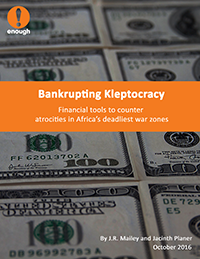
Note: This blog contains excerpts directly from the report.
Today, the Enough Project released a new report, “Bankrupting Kleptocracy: Financial Tools to Counter Atrocities in Africa’s Deadliest War Zones,” by J.R. Mailey and Jacinth Planer. The report describes how the state in several conflict-affected countries in East and Central Africa has been hijacked and transformed from an institution that is supposed to provide social services and safeguard the rule of law into a predatory criminal enterprise that does quite the opposite. The international community has the power to chip away at the environment of impunity that characterizes these violent kleptocracies—and the United States is in a position to play a leading role.
Tune in at 2 p.m. EDT today to watch the livestream
In these hijacked states, criminal cells use state power to loot public coffers and natural resource wealth with impunity—and to sideline or silence those who get in their way. Oversight institutions are co-opted, marginalized, removed altogether, or used as political instruments to abuse opponents or independent voices. Leaders loot natural resources and divert state funds, funneling public money directly into the instruments of war and repression. Security forces use lethal force to quell protests, and countless journalists and activists are attacked, intimidated, and harassed. Violent, kleptocratic regimes often deny any sort of peaceful path to political turnover or meaningful power-sharing, thereby encouraging the rise of armed opposition movements and cycles of increasingly deadly force, marked especially in East and Central Africa by the commission of mass atrocities.
As the report describes, the globalized economy allows kleptocrats and their enablers to store, move, and launder ill-gotten gains. The U.S. government can, with its partners, leverage the interconnectivity of the global economy, the size and primacy of the U.S. financial system, and the significance of the U.S. dollar in global trade to target kleptocrats and their ill-gotten gains.
“For decades, the United States and other international donors have poured billions of dollars into peace talks and endless peacekeeping missions. Although these efforts can be valuable parts of an effective peacebuilding strategy, they often fail to achieve the desired result because they don’t address a core root cause and driver of war: the warped incentive structures of officials who hijack state institutions, loot public funds and natural resources, and use extreme violence to maintain their grip on power.” – John Prendergast, Enough Project Founding Director
“Bankrupting Kleptocracy” highlights the potential of three types of tools to build leverage in the fight against violent kleptocracy: targeted sanctions, anti-money laundering provisions, and anti-bribery laws, including the Foreign Corrupt Practices Act (FCPA). The U.S. government has used these tools to counter terrorism, nuclear proliferation, and organized crime. These same tools, the authors argue, can be used to fight kleptocracy in East and Central Africa.
Targeted Sanctions:
- Targeted financial sanctions are a potent tool to counter kleptocracy precisely because of their ability to impact the target the wealth of senior officials within kleptocratic regimes. This directly addresses the need to alter kleptocrats’ problematic incentive structures, which in this region are often oriented in favor of violent extraction of wealth and repression of dissent.
- Sanctions can be used to alter incentives to violently extract wealth and repress dissent by:
- Targeting the wealth of senior officials
- Targeting individuals who engage in public corruption, undermine democracy, or stifle free speech and assembly
- Targeting those who facilitate and enable kleptocracy (lawyers, wealth managers)
- Targeting secondary actors who do business with those who are under sanctions
- Targeting certain business sectors but not others
- Limiting the negative impact on humanitarian and social services by clarifying and expanding sanctions exemptions.
Anti-Money Laundering and Asset Forfeiture:
- Numerous anti-money laundering (AML) statutes provide the U.S. government with the power to trace, block and, in some cases, seize the illicit proceeds of overseas corruption. Anyone who knowingly facilitates the movement of the illicit funds into or through the United States (including the U.S. financial system) is engaging in money laundering and could be subject to criminal prosecution as a result.
- The Treasury Department’s Financial Crimes Enforcement Network (FinCEN) has significant authority to place enhanced due diligence requirements on financial institutions, investigate financial crimes, and even impose sanctions-like prohibitions on overseas entities believed to be involved in money laundering. Moving forward, FinCEN should use these powers to identify banks, institutions, and classes of transactions that kleptocrats use to loot and launder state assets.
Foreign Corrupt Practices Laws:
- A foundational element of the U.S. framework for countering violent kleptocracy is the Foreign Corrupt Practices Act (FCPA). This law imposes a compliance requirement that places certain record-keeping and accounting requirements on U.S. firms doing business overseas and criminalizes bribery of foreign officials in order to gain a competitive advantage.
- Tools like the FCPA should be more vigorously deployed in countries marked by violent kleptocracy where its impact will be more effective and meaningful in terms of saving lives.
Steps must also be taken to ensure that the U.S. government agencies that are responsible for administering the tools of financial pressure have access to sufficient staff, resources, and intelligence about foreign officials engaging in corruption.
These financial pressure measures should be used to create leverage in support of broader political and diplomatic strategies that are developed in concert with international partners and organizations like the United Nations (UN), European Union (EU), and African Union (AU). The U.S. government must also continue to cultivate international partnerships to investigate and prosecute the perpetrators of corruption and use a variety of international forums to push reform-minded governments around the world to enhance anti-corruption controls and bolster their own capacity to deploy tools of financial pressure.
Take Action: Urge President Obama to Use Financial Tools to Support Peace in South Sudan >

